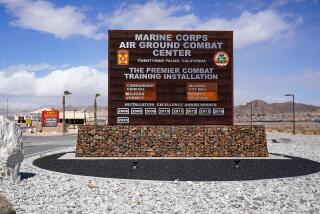U.S. Education Specialist Killed in Baghdad
WASHINGTON — Secretary of State Colin L. Powell announced Wednesday that a State Department education specialist was killed in Iraq.
James Mollen, who had spent about a year in Iraq, was shot to death in a vehicle outside Baghdad’s Green Zone, the high-security area where Iraqi officials and U.S. diplomats stay, American officials said.
Powell said Mollen was a consultant to Iraq’s ministers for education and higher education.
“The Department of State and I grieve over this tragic loss. We offer Jim’s family and friends our condolences. We too have lost one of our own,” Powell said.
In October, another State Department employee, security officer Ed Seitz, was killed during an attack at a U.S. base near Baghdad’s international airport.
Elsewhere in Iraq, Marine officers said Wednesday that U.S. and Iraqi troops sweeping Fallouja had uncovered a weapons cache big enough to fuel a nationwide rebellion and that clearing the arms is delaying the return of civilians.
Most of Fallouja’s estimated 250,000 residents left the city before the offensive against insurgents this month. “It will be probably several more weeks” before significant numbers can return, said Lt. Col. Dan Wilson of the 1st Marine Expeditionary Force.
“The amount of weapons was in no way just to protect a city,” said Marine Maj. Jim West. “There was enough to mount an insurgency across the country.”
A huge store of weapons and explosives was discovered at the mosque of Abdullah Janabi, a Sunni Muslim cleric and insurgent leader, according to the New York Times.
The newspaper said the mosque compound in a residential area had sheds stacked with dynamite, mortar shells, bombs, guns, rocket-propelled grenades and ammunition. A naval mine was on the street outside, it said.
Military officers said there were no weapons in Janabi’s house nearby, but the newspaper quoted them as saying they discovered files on people who had been tortured and executed for cooperating with U.S. authorities and their allies.
Marines clearing houses in Fallouja have found Kalashnikov rifles, ammunition, rocket-propelled grenades, artillery shells and heavy-caliber cannons -- with weapons caches often marked by a brick hanging by a string on the outside walls of homes.
U.S. and Iraqi forces moving into the city smashed much of the insurgents’ weaponry, bending gun barrels to prevent future use. Many large weapons caches were blown up with only a cursory attempt at inventory.
West said U.S. forces found a book with descriptions of nerve agents, but he gave no specifics.
More to Read
Sign up for Essential California
The most important California stories and recommendations in your inbox every morning.
You may occasionally receive promotional content from the Los Angeles Times.










